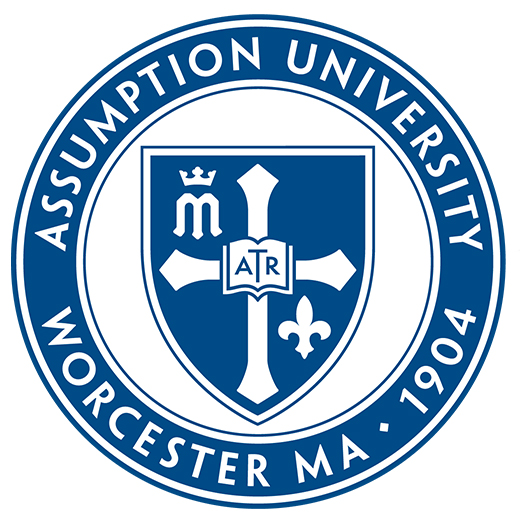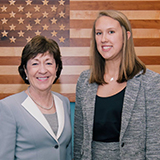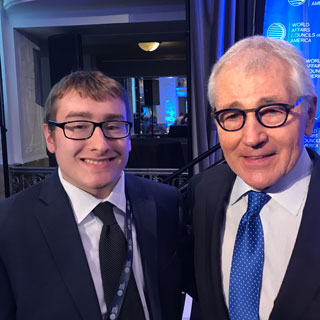Learning goals:
- Knowledge of Fundamentals of Political Philosophy
- Knowledge of Fundamentals of American Politics
- Knowledge of Fundamentals of Public Policy
- Knowledge of Fundamentals of Major Foreign States
- Knowledge of Fundamentals of International Relations
The Department of Political Science aims to develop in students a capacity to address rationally the political issues that are among the most enduring and which have animated communities throughout political history. The major thus grounds students in the fundamental principles and problems of a science whose tradition is venerable, but whose relevance to contemporary life is immediate. In other words, we don’t just train young men and women to become effective contributors to the modern global economy; we educate them for the noble callings of statesmanship, of public service, and, perhaps most importantly, of thoughtful and responsible citizenship.
To achieve this end, majors in Political Science will study the work of Aristotle, Thucydides, Cicero, Plutarch, Aquinas, Machiavelli, Shakespeare, Locke, Rousseau, the Federalists, Marx, and Tocqueville, as well as the best examples of modern and contemporary political reflection (Aron, Solzhenitsyn, Huntington, Fukuyama, Manent). By engaging these texts in their classes and with each other, students will develop the skills necessary to write correctly and persuasively, think dialectically, and speak to their fellow citizens with conviction and clarity. More broadly, such an education will cultivate an appreciation for the classical and modern contributions to our own political traditions, especially their ability to highlight the strengths and weaknesses of liberal democratic politics.
This approach also exposes students to competing theories on the international system, the nature of various political orders, and the most pressing issues confronting America and the world. So while the major will prepare students to participate meaningfully in a variety of fulfilling vocations, the distinctive approach that we adopt prepares students to become reflective, clear-sighted, and independent citizens capable of contributing to the well-being of our American democratic republic. In short, we educate students to become responsible citizen-rulers.
A major in political science will cover significant topics such as:
- American National Government
- American Public Policy and Administration
- Major Foreign States
- Political Philosophy
- International Politics
Not only does this engaging course of study help you prepare for a career in fields such as business, government service, international affairs, journalism, law, and teaching, but also prepares you to contribute to the American political system.
Assumption’s bachelor’s degree in political science will develop your analytical skills and help you communicate effectively. Prepare for an exciting career in a variety of fields or for graduate study.
Jeremy Geddert, Ph.D.
An Ideal Place to Learn
Faculty
Experiential Learning
Assumption's Rome Campus
At Assumption's campus in Rome, Italy, the city and the country become your classroom through daily and weekend-long excursions throughout "the eternal city" and the Italian countryside. This unique study abroad experience will enrich your academic and cultural pursuits as you walk in the footsteps of emperors and gladiators then enjoy delectable Italian cuisine or perhaps a cappuccino after class in a local cafe. (Did you know that your financial aid follows you to Rome?)
Explore the Rome CampusLearn the Skills Employers Seek
Faculty/Student Research
The Assumption curriculum encourages scholarly and real-world experience. With hands-on research conducted alongside faculty mentors, students gain a depth of knowledge and skills that lead to professional success and personal fulfillment.Study Abroad
At Assumption University, the world is your classroom. Students can study and explore abroad in over 50 places from Vienna to England, South Africa, and even our own campus in historic, yet modern, Rome, Italy. Assumption’s study abroad program offers culture, history, and a living classroom for all.Internships
Assumption starts planning for your future the day you arrive on campus. Our Career Development and Internship Center helps students secure exciting and fulfilling internships where you’ll apply knowledge obtained in the classroom in a professional setting, preparing for a future career or additional study. Assumption connects students to internship opportunities in corporations, government agencies, research hospitals, non-profit organizations, and more.Pathways to Success
Testifying to the virtue of our distinctive and classical study of politics, our graduates have studied at world renowned institutions and are employed in industries from healthcare to finance to government at all levels.
Avery Dennison
Boston Financial Corp.
International War Crimes Tribunal (Tanzania)
Massachusetts State Senate
Northeastern University
NSTAR
TJX
U.S. House of Representatives
The White House
First-rate Academics in a Catholic University Setting
Assumption University awakens in students a sense of wonder, discovery, and purpose, forming graduates known for their intellectual seriousness, thoughtful citizenship, and devotion to the common good. Students are provided an education that shapes their souls, forms them intellectually, and prepares them for meaningful careers. Enlivened by the harmony of faith and reason, here, students’ minds and hearts are transformed.
Assumption is dedicated to providing a clear understanding of what your education will cost
We’ll help cut through the complexity of financing your education, ensuring you understand what you need, how to apply for aid, and what’s expected of you. You will be assigned a personal financial aid advisor who will guide you through the process and answer all of your financial aid-related questions.












